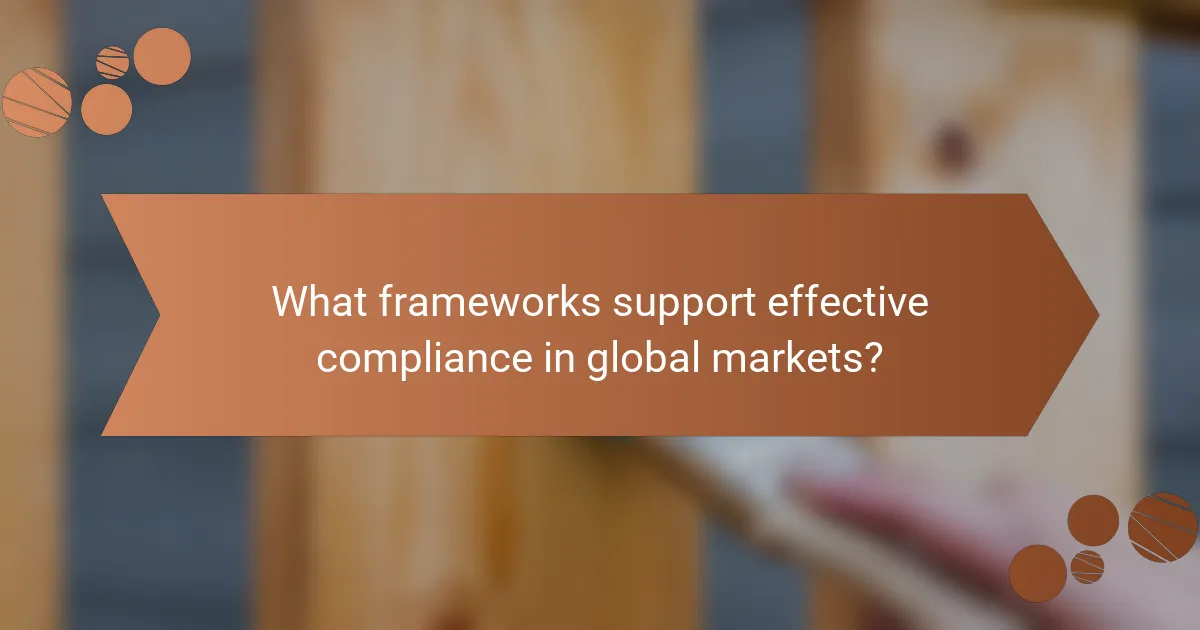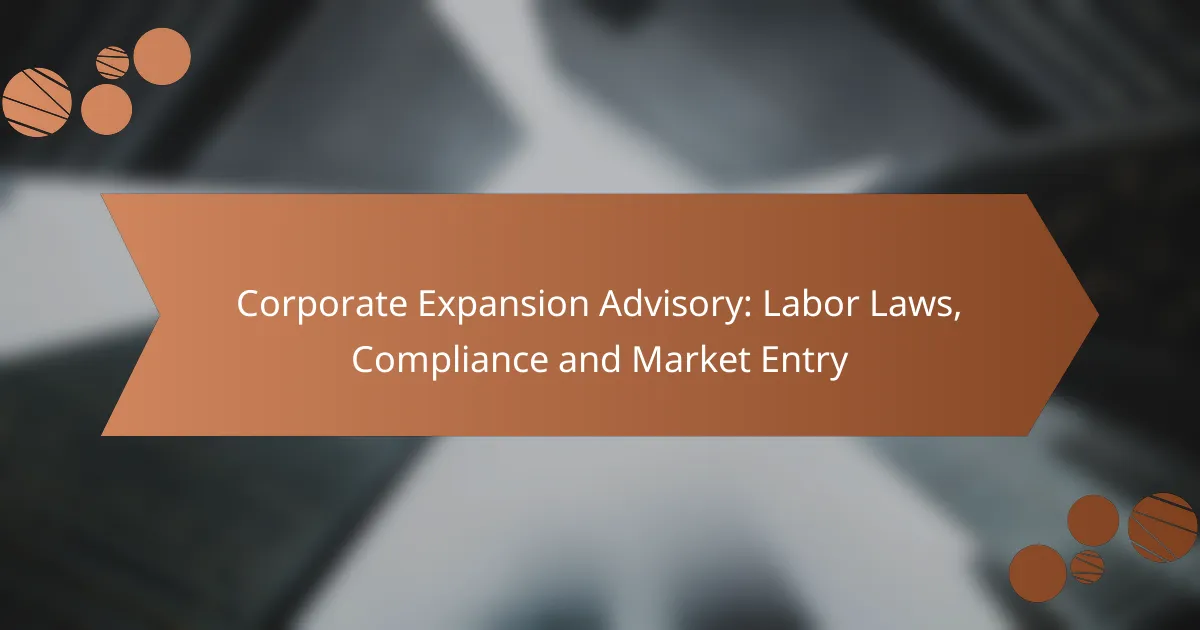In today’s competitive landscape, corporate expansion requires a strategic approach to safeguarding intellectual property (IP) rights, ensuring compliance with local regulations, and implementing effective market protection strategies. By securing IP rights, companies can protect their innovations and enhance their market position while navigating the complexities of international regulations. A thorough understanding of local laws and competitive dynamics is essential for mitigating risks and maximizing opportunities in new markets.

How can corporate expansion be protected through intellectual property rights?
Corporate expansion can be safeguarded through intellectual property (IP) rights, which provide legal protections for innovations, branding, and creative works. By securing these rights, companies can prevent unauthorized use and enhance their market position.
Patents for innovative products
Patents protect new inventions and processes, granting exclusive rights to the inventor for a limited time, typically 20 years. This exclusivity allows companies to capitalize on their innovations without competition, making it essential to file for a patent as soon as a product is developed.
When considering a patent, ensure that the invention is novel, non-obvious, and useful. Conducting a thorough patent search can help avoid infringement on existing patents and streamline the application process.
Trademarks for brand identity
Trademarks protect symbols, names, and slogans that distinguish goods or services. Registering a trademark provides legal backing against unauthorized use, helping to maintain brand integrity and consumer trust.
To secure a trademark, choose a unique name or logo and file an application with the relevant authority, such as the United States Patent and Trademark Office (USPTO) in the U.S. Regular monitoring and enforcement of trademark rights are crucial to prevent dilution or infringement.
Copyrights for creative works
Copyrights protect original works of authorship, including literature, music, and art. This protection is automatic upon creation, but registering with the copyright office can enhance legal recourse in case of infringement.
When dealing with copyrights, consider the duration of protection, which typically lasts the life of the author plus 70 years. It’s important to understand fair use policies to avoid unintentional violations while using copyrighted material.
Trade secrets for confidential information
Trade secrets encompass confidential business information that provides a competitive edge, such as formulas, practices, and processes. Unlike patents, trade secrets do not require registration but must be actively protected through confidentiality agreements and security measures.
To maintain trade secrets, implement strict access controls and educate employees about the importance of confidentiality. Regularly review and update security protocols to safeguard sensitive information from potential leaks or theft.

What compliance measures are essential for international expansion?
Essential compliance measures for international expansion include understanding local regulations, adhering to export controls, and implementing data protection policies. These steps help businesses navigate legal landscapes and mitigate risks associated with entering new markets.
Understanding local regulations
Understanding local regulations is crucial for successful international expansion. Each country has its own set of laws governing business operations, including labor laws, tax obligations, and industry-specific regulations. Companies should conduct thorough research or consult local legal experts to ensure compliance.
For example, a business entering the European Union must comply with EU regulations, which can include product safety standards and environmental laws. Failing to adhere to these regulations can result in fines or restrictions on market entry.
Adhering to export controls
Adhering to export controls is vital for companies that deal with goods, technology, or services that may be subject to restrictions. Many countries have regulations that dictate what can be exported and to whom, often based on national security or foreign policy considerations.
Businesses should familiarize themselves with the export control laws of both their home country and the target market. For instance, the U.S. has the Export Administration Regulations (EAR) that govern the export of dual-use items. Non-compliance can lead to severe penalties, including fines and loss of export privileges.
Implementing data protection policies
Implementing data protection policies is essential for safeguarding sensitive information when expanding internationally. Different countries have varying laws regarding data privacy, such as the General Data Protection Regulation (GDPR) in the EU, which imposes strict guidelines on data handling and user consent.
Companies should assess their data practices and ensure they align with local regulations. This may involve updating privacy policies, training staff on data handling, and establishing protocols for data breaches. Failure to comply with data protection laws can result in significant fines and damage to reputation.

How to assess market protection strategies in new regions?
Assessing market protection strategies in new regions involves understanding local regulations, competitive landscapes, and potential barriers to entry. A thorough evaluation can help safeguard intellectual property and ensure compliance while maximizing market opportunities.
Conducting competitive analysis
Conducting a competitive analysis is essential to identify existing players in the new market and their strategies. This involves examining competitors’ strengths, weaknesses, market share, and pricing strategies. Tools like SWOT analysis can help clarify how your offerings can differentiate in the local context.
Consider gathering data on competitors through market reports, online reviews, and customer feedback. This information can guide your positioning and highlight gaps in the market that your business can exploit.
Evaluating market entry barriers
Evaluating market entry barriers is crucial for understanding the challenges your business may face. Common barriers include regulatory requirements, tariffs, and local competition. Assessing these factors can help you determine the feasibility of entering a new market.
For instance, some countries may have stringent intellectual property laws or require local certifications that can delay entry. Researching these regulations early can save time and resources, allowing for a smoother market entry process.
Utilizing local partnerships
Utilizing local partnerships can significantly enhance your market protection strategies. Collaborating with local firms can provide insights into cultural nuances and regulatory compliance, which are vital for successful market entry. These partnerships can also facilitate access to established distribution networks and customer bases.
Consider forming alliances with local businesses or industry associations that can offer support and credibility. This approach not only helps in navigating the local landscape but also strengthens your market position against competitors.

What role does due diligence play in corporate expansion?
Due diligence is essential in corporate expansion as it helps identify potential risks and ensures compliance with legal and regulatory requirements. This process involves a thorough investigation of various aspects of the business, including financial health, market conditions, and intellectual property rights.
Identifying potential risks
Identifying potential risks during corporate expansion involves assessing various factors that could impact the business’s success. This includes market volatility, regulatory changes, and competitive threats. Companies should conduct a SWOT analysis (Strengths, Weaknesses, Opportunities, Threats) to systematically evaluate these risks.
Additionally, it is crucial to analyze the local market conditions and cultural nuances in the target region. For example, understanding consumer behavior and preferences can help mitigate risks associated with market entry. Companies should also consider geopolitical factors that may affect operations.
Evaluating intellectual property assets
Evaluating intellectual property (IP) assets is a critical component of due diligence in corporate expansion. Companies must identify and assess their existing IP portfolio, including patents, trademarks, and copyrights, to ensure they are adequately protected in new markets. This evaluation helps in understanding the value of these assets and potential infringement risks.
Furthermore, businesses should investigate the IP landscape in the target market, including existing patents and trademarks that may pose challenges. Engaging with local legal experts can provide insights into compliance requirements and help navigate the complexities of IP laws in different jurisdictions.

What frameworks support effective compliance in global markets?
Effective compliance in global markets is supported by established frameworks that guide businesses in adhering to local laws and international standards. These frameworks help ensure that companies meet regulatory requirements while protecting their intellectual property and market position.
ISO standards for quality management
ISO standards, particularly ISO 9001, provide a framework for quality management systems that enhance operational efficiency and customer satisfaction. Companies adopting these standards can streamline processes, reduce waste, and improve product quality, which is crucial for maintaining compliance in diverse markets.
Implementing ISO standards often involves regular audits and continuous improvement practices. Organizations should consider training staff on these standards to ensure everyone understands compliance requirements and quality objectives.
Compliance checklists for various jurisdictions
Compliance checklists are essential tools for navigating the complex regulatory landscapes of different jurisdictions. These lists typically include requirements related to labor laws, environmental regulations, and data protection standards, which vary significantly across regions.
Businesses should customize their compliance checklists based on the specific regulations of each market they enter. Regularly reviewing and updating these checklists can help avoid common pitfalls, such as overlooking local tax obligations or failing to comply with consumer protection laws.



